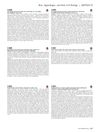 January 2024 in “Journal of applied biological chemistry”
January 2024 in “Journal of applied biological chemistry” Glehnia littoralis and Andrographis paniculata extracts can significantly boost hair growth.
 December 2023 in “Frontiers in endocrinology”
December 2023 in “Frontiers in endocrinology” Excess androgens may cause PCOS, not just be a symptom.
 June 2023 in “Livestock studies”
June 2023 in “Livestock studies” The article concludes that understanding the molecular processes in hair follicle development can improve the quality of fibers like Angora and cashmere.
 November 2022 in “Gigascience”
November 2022 in “Gigascience” A specific genetic deletion in goats affects cashmere yield and thickness.
 September 2022 in “Research Square (Research Square)”
September 2022 in “Research Square (Research Square)” Increasing Rps14 helps grow more inner ear cells and repair hearing cells in baby mice.
 January 2022 in “bioRxiv (Cold Spring Harbor Laboratory)”
January 2022 in “bioRxiv (Cold Spring Harbor Laboratory)” Skin lesions in Carney complex are likely caused by a specific group of skin cells that promote pigment production due to a genetic mutation.
 April 2021 in “Journal of Investigative Dermatology”
April 2021 in “Journal of Investigative Dermatology” Leontopodium alpinum extract may help reduce hair shedding by keeping hair in the growth phase longer.
 September 2020 in “bioRxiv (Cold Spring Harbor Laboratory)”
September 2020 in “bioRxiv (Cold Spring Harbor Laboratory)” Different fish use the same genes to regrow teeth.
 January 2020 in “Elsevier eBooks”
January 2020 in “Elsevier eBooks” Plant-based chemicals may help hair growth and prevent hair loss but need more research to compete with current treatments.
 April 2018 in “Journal of Investigative Dermatology”
April 2018 in “Journal of Investigative Dermatology” Cutaneous lupus patients have higher levels of certain immune cells in their blood and skin.
 April 2018 in “Journal of Investigative Dermatology”
April 2018 in “Journal of Investigative Dermatology” IL-17C is important in inflammatory skin diseases and could be a target for treatment.
 April 2018 in “Journal of Investigative Dermatology”
April 2018 in “Journal of Investigative Dermatology” Topical tofacitinib is effective in promoting hair growth for non-scarring alopecia.
 April 2018 in “Journal of Investigative Dermatology”
April 2018 in “Journal of Investigative Dermatology” Light can activate hair growth through a pathway from the eyes to hair follicles.
 April 2017 in “Journal of Investigative Dermatology”
April 2017 in “Journal of Investigative Dermatology” Cow milk sugars increase fat production and inflammation in skin oil cells.
 April 2017 in “Journal of Investigative Dermatology”
April 2017 in “Journal of Investigative Dermatology” The BMP/Smads pathway and Id2 gene control hair follicle stem cells, affecting their rest and growth phases.
 April 2015 in “Andrology”
April 2015 in “Andrology” HNG may help prevent the negative effects of chemotherapy on sperm production and white blood cell counts.
 November 2014 in “John Wiley & Sons, Ltd eBooks”
November 2014 in “John Wiley & Sons, Ltd eBooks” Eating high-glycemic and dairy foods can increase hormones that may cause acne and other health issues.

Chrysanthemum zawadskii extract may help treat hair loss by promoting hair growth and affecting growth factors.
 April 2003 in “Experimental Dermatology”
April 2003 in “Experimental Dermatology” The workshop highlighted the genetic links and psychological impacts of hair loss and skin disorders.
 421 citations,
April 2012 in “The New England Journal of Medicine”
421 citations,
April 2012 in “The New England Journal of Medicine” Alopecia Areata is an autoimmune condition causing hair loss with no cure and treatments that often don't work well.
 401 citations,
January 2013 in “Postepy Dermatologii I Alergologii”
401 citations,
January 2013 in “Postepy Dermatologii I Alergologii” The paper concludes that understanding melanocyte development can help in insights into skin diseases and melanoma diversity.
 224 citations,
March 2006 in “Seminars in Cutaneous Medicine and Surgery”
224 citations,
March 2006 in “Seminars in Cutaneous Medicine and Surgery” The document concludes that understanding hair follicle biology can lead to better hair loss treatments.
 115 citations,
September 2012 in “Experimental Dermatology”
115 citations,
September 2012 in “Experimental Dermatology” Androgens have complex effects on hair growth, promoting it in some areas but causing hair loss in others, and our understanding of this is still evolving.
 86 citations,
July 2020 in “International Journal of Molecular Sciences”
86 citations,
July 2020 in “International Journal of Molecular Sciences” Activating the Wnt/β-catenin pathway could lead to new hair loss treatments.
 52 citations,
September 2018 in “International Journal of Molecular Sciences”
52 citations,
September 2018 in “International Journal of Molecular Sciences” Ginseng and its compounds may help hair growth and prevent hair loss, but more human trials are needed to confirm this.
 48 citations,
June 2013 in “Journal of Dermatological Science”
48 citations,
June 2013 in “Journal of Dermatological Science” Valproic acid may help hair grow and could be a safe treatment for hair loss.
 39 citations,
September 2011 in “Tissue Engineering Part B-reviews”
39 citations,
September 2011 in “Tissue Engineering Part B-reviews” Hair follicle regeneration in skin grafts may be possible using stem cells and tissue engineering.
 39 citations,
January 2008 in “Journal of Endocrinology”
39 citations,
January 2008 in “Journal of Endocrinology” SCF and c-Kit decrease in AGA hair follicles, possibly affecting hair pigmentation and growth.
 36 citations,
November 2009 in “Journal of Investigative Dermatology”
36 citations,
November 2009 in “Journal of Investigative Dermatology” Prolactin may affect hair growth differently based on gender and scalp area.
 33 citations,
September 2017 in “Molecules”
33 citations,
September 2017 in “Molecules” Red ginseng oil and its components help promote hair regrowth and could treat hair loss.






























